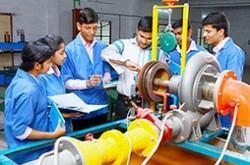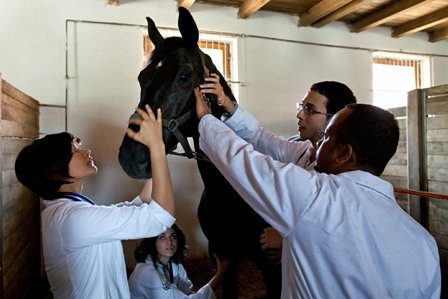

"Indian Institute of Allied Health Sciences'' accredited as an Autonomous Institution, Working as per the schemes launched and the norms under "National Health Mission'' (NHM) of Govt. of India under Ministry of Health and Family Welfare.
In March 2011, the Ministry of Health and Family Welfare nominated the Public Health Foundation of India (PHFI) as its technical partner and constituted the National Initiative for Allied Health Sciences (NIAHS) secretariat with a mandate to develop a framework to improve allied health training, education and regulation in the country.
Fundamental to the national initiative- undertaken by the health ministry- is the vision to bring uniformity to teaching methodology, clarify protocols of certification and set national standards for regulation of allied health sciences and professionals. The initiative comes at a time when the Government of India- under the 12th five year plan- has set itself the target of providing affordable and accessible healthcare to all citizens. India's mandate for universal health coverage, to a great extent, depends on the availability of qualified and adequate allied health professionals at primary, secondary and tertiary levels in both private and public sector. Addressing shortages in human resources is the first step towards expanding the reach of health services in underserved areas. The terms of reference set by the health ministry directed the NIAHS secretariat to map the allied health training landscape and the current regulatory framework for various allied health disciplines. Over a period of 10 months the NIAHS secretariat conducted extensive desk review, primary and secondary research to compile a detailed situational analysis of the existing allied health space in India.
Central to the recommendations developed for reconfiguring and restructuring the allied health space, is setting up of dedicated national and regional institutes with the objective of nurturing talent, retaining allied health professionals and strengthening the health systems to align it with the overarching goal of providing universal health coverage to Indians. Research by the NIAHS secretariat has indicated vast inter and intra state differences with public and private facilities struggling to cope with increasing human resources costs, shortages, uneven distribution and skill-mix imbalances.
India has traditionally leaned towards a 'doctor-centered' healthcare delivery, with little attention paid to specialization in allied health sciences. Investing in allied health professionals has, at no point in history, been so crucial to reforms in public health sector. Corrections to bridge demand and supply gaps – ensuring sustained availability of allied health professionals for future generations — remains a cornerstone in India's plans for healthcare reforms.
Population based human resource norms, for India's health services, set as early as 1946 by the Bhore Committee, are yet to be achieved. The Bhore Committee had recommended one nurse per 500 persons; one pharmacist per 2000 persons, one laboratory technicians per 30,000 persons; one health inspector per 20,000 persons (Chaddha committee); one male and female health worker for 3000-3500 persons at primary level of care.
As India struggles with heavy disease burdens, with the emerging challenge of noncommunicable diseases superimposed on the urgency of achieving millennium development goals, deficiencies in human resources- in terms of both skills and numbers- will be formidable barriers to India's health care sector reforms. It is of pivotal importance that these are overcome through initiatives that address both the scale and quality of our health workforce.
The NIAHS secretariat has studied global best practices, especially models followed by other low and middle income countries, while developing strategies relevant to the Indian context. To put together this report, a dedicated project secretariat was established at the Health Systems Support Unit of PHFI, which consulted over 300 experts while the project was in progress. The NIAHS secretariat also gained immensely from their consultations with experts in the health ministry.
This report is a pioneering initiative by the health ministry which aims to address the challenges faced by allied health professionals, for the first time, as a national priority. We hope this report will encourage public discourse and propel academicians, civil society and policy makers to collaborate in designing and implementing targeted interventions for the much required corrections in all aspects of the allied health professional space.
The NIAHS report provides an overarching framework to realign India's human resources in accordance with the growing demands of the health sector. This report is only the first step in a journey that will require concerted efforts from all stake holders to turn the aspirational goal of universal health coverage into a reality for India.



